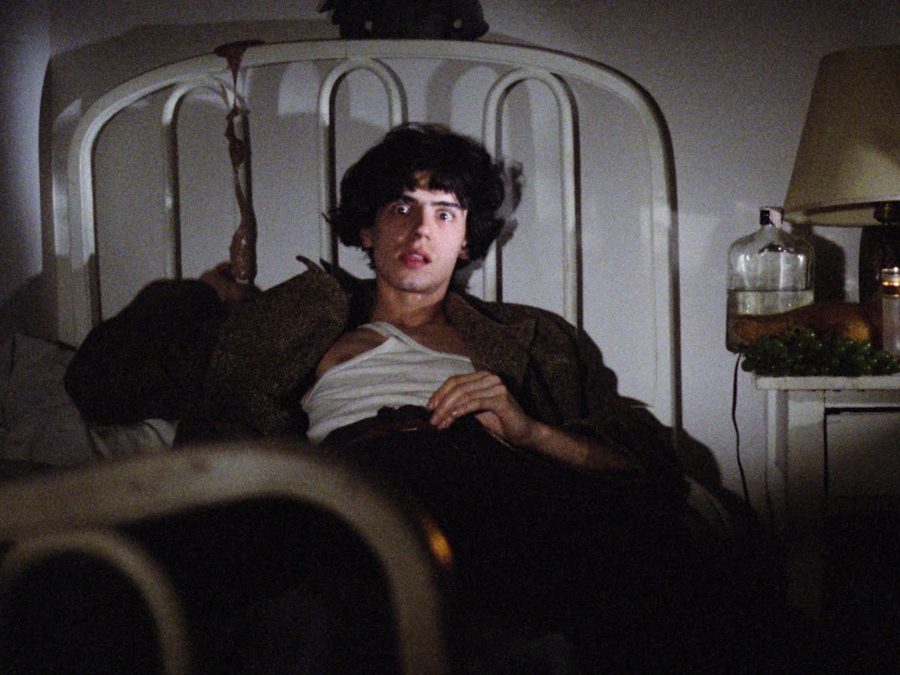Arrebato begins with a shot of a celluloid strip being cut – a promise of a feature where the very medium of film will play a prominent rôle. Sure enough, this is a film about two filmmakers, about the films that they make together and apart, and ultimately about the consumptive power of filming and viewing.
José Sirgado (Eusebio Poncela) is a discontented horror director based in Madrid, whose latest cheapo flick has been cut, at his own insistence, to end with the vampiress not shown burning alive (as José’s editor would like), but instead looking straight to camera in defiant exultation. “She stares at the audience and they’ll get it that she’s delighted to be a vampire. She loves it, no regrets. And there the story ends. Full stop,” José insists, adding: “The important thing is knowing what she does and doesn’t want. Nothing else matters. Redundant.”
José returns to his apartment to find two blasts from a happier past: his junkie former star and ex-girlfriend Ana Turner (Cecilia Roth) passed out in his bed; and a mail package containing a door key, a cassette tape and a reconstructed Super-8 film reel from his old friend Pedro (Will More). As José listens to Pedro’s recorded message, he is taken on a trip down memory lane, as flashbacks show their first encounter, 12 months earlier in the countryside near Segovia at the house where Pedro lived with his cousin Marta, (Marta Fernández Muro) and their aunt Carmen (Carmen Girlat), and where José was contemplating a possible location shoot.
Pedro is, putting it mildly, weird: constantly sporting a heavy overcoat in the summer heat and playing with toy slime, he is a 27-year-old adult trying, Peter Pan-like, to remain a 12-year-old boy, and an amateur experimental filmmaker struggling to shoot suspended moments of enraptured pauses (Arrebato means ‘rapture’) for his own private amusement. José is fascinated and seduced by this strange manchild, and soon returns with Ana (whom he has just introduced to heroin) for a bizarre weekend of sex, drugs and home videos.
That was a year ago, and José has long since forgotten about Pedro and ditched Ana – but now Ana is back, and this audio tape, along with Pedro’s latest, possibly last film, lures José to learn of his friend’s fate, and perhaps to abandon himself to the same self-destructive path.

There are three sides to this bizarre love triangle: eros, heroin and film. The drug facilitates the distracted states that Pedro longs to capture; the sex, though impeded by the drug, cements the trio’s union; and Pedro’s movies are an unreliable record of the resulting ecstasy, where perhaps what is most important disappears between the frames, or is edited out. As José uses the key to enter Pedro’s city apartment and to retrace his final moments, he will, like Pedro, be devoured by cinema itself, and lost in the cut.
Marta describes Pedro’s home movies as ‘hallucinema’ – a portmanteau word which might serve equally to describe Arrebato itself. For it attempts, like Pedro’s reels, to capture on film the hedonism that was emerging in the wake of Francisco Franco’s 1975 death, as its pleasure-seeking characters pursue addictions, both pharmaceutical and bisexual, that would have been censored under the fascist dictator. Yet it is also, like the vampire film on which José has half-heartedly been working, a horror rooted in what is absent, elided and unseen.
Meanwhile, listen closely and you might recognise that Gloria (Helena Fernán-Gómez), one of Pedro’s new friends in Madrid, is voiced by none other than Pedro Almodóvar, who would soon, as a filmmaker in his own right, have the rest of the world enraptured by the cinema of a newly democratic Spain. Here, though, ironically enough, the character that Almodóvar plays together with Fernán-Gómez is responsible not so much for making a film as for ruining one, as she turns away a camera that is supposed to be shooting Pedro as he sleeps.
This oddity from writer/director Iván Zulueta is hard to pin down. Its dramatis personae, coming from Spain’s recently liberated bohemian demimonde, are alienating and unlikeable, and their relationships impenetrable. Its horror exists purely (and literally) in camera, and ends in the blank emptiness to which José and Pedro have been travelling all along.
And yet there is nothing else quite like it – a film where cinema itself is the ultimate vampire, and its subject the prey, addicted to the rapture of being caught and drained. Here, much as José says of his own film, the victims’ more or less willing desire is all that counts, and the details of their ruin irrelevant.
Arrebato is released on Blu-ray by Radiance, 17th April, 2023
The post A troubled filmmaker goes through hell in Iván Zulueta’s Arrebato appeared first on Little White Lies.
from Little White Lies https://ift.tt/isC47uc
via IFTTT


0 Comments